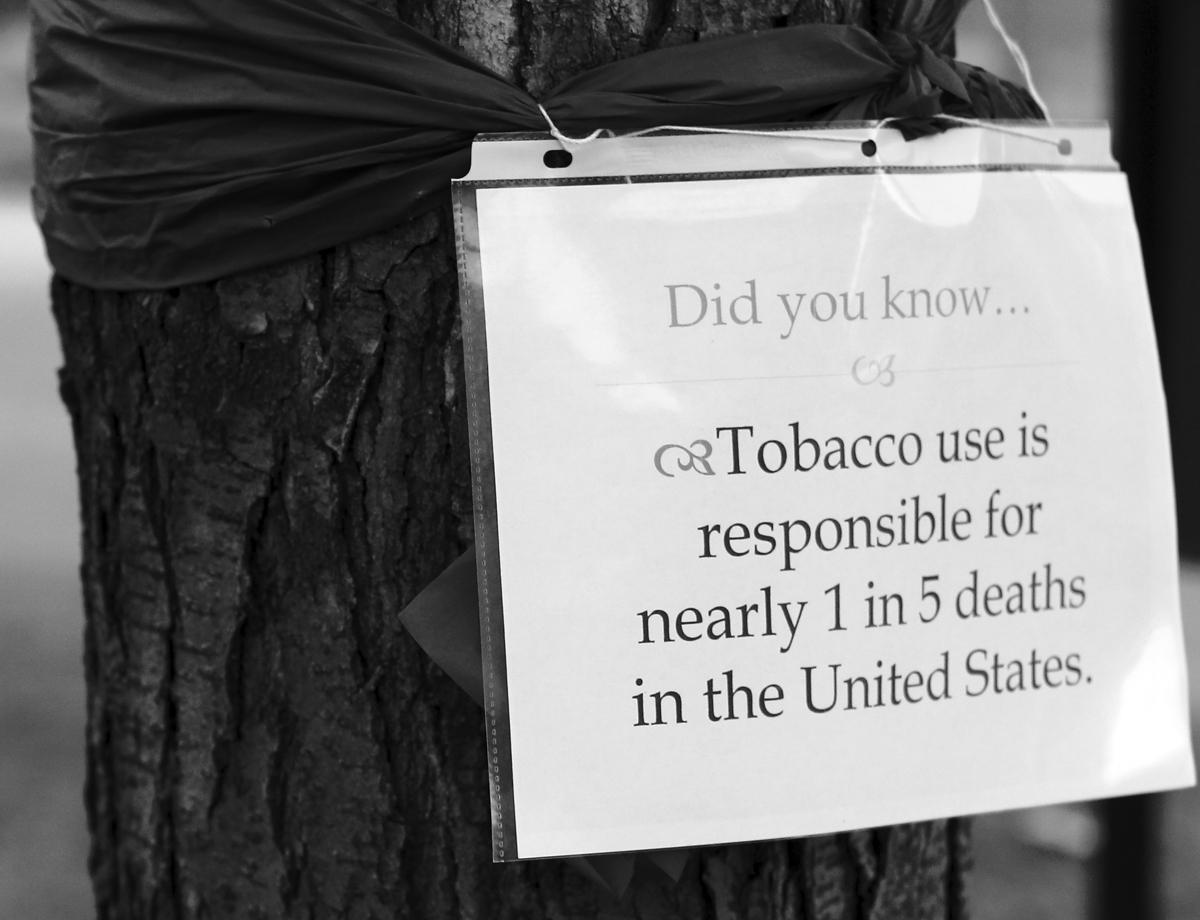Group joins national campaign to help people quit smoking
Cigarettes have been killing smokers since the first tobacco was rolled into a smokable form and for 36 years the American Cancer Society has been warning users of the dangers.
USU clubs and service organizations coordinated efforts Wednesday and Thursday to produce the Great American Smoke Out, an event directed at helping people quit smoking.
“Tobacco is such a harmful drug, and we want it to be gone,” said Kasie Barger, president of USU’s chapter of Colleges Against Cancer. “If one person was able to quit because of something that we said — or a quit kit that we gave to them — that would be awesome, to me.”
The USU Student Health and Wellness center, Colleges Against Cancer, the local Respira Network and the Bear River Health Department all worked together to organize the event.
“It’s a way to try and get students on campus — or anyone on campus — to stop smoking,” said Rosemarie Horne, a wellness center intern and volunteer for the event. “It’s been 36 years that the cancer society has been doing the Great American Smoke Out.”
The event included a two-day information booth offering “quit packets” and brochures with support numbers. A balloon launch was executed in honor of those affected by tobacco.
The event ended with a speech from Monica Thunell, the primary organizer of the event and member of the Respira Network and the Bear River Health Department.
“We want to encourage people we know to quit today,” Thunell said. “Even if it’s one day. If they can make it two days, even better. Do anything you can … something that will keep their mouth or their mind or their hands off of that tobacco product.”
Ryan Barfuss, the prevention specialist for the wellness center, was another main initiator of the event. He said it’s important to help people know there is support available in the fight against tobacco addiction.
“We had a number of people come by the booth today,” Barfuss said. “If one of those people quit smoking because of the information we gave them today, that’s worth it right there.”
A few years ago, Barfuss said, he headed an initiative on the TSC Patio, at bus stops and in large groups to butt out tobacco use. Barfuss said the initiative found plenty of support from students and community members, but was shut down when it reached the Faculty Senate.
“There are a lot of concerns with international students coming here — with recruiting of faculty and staff.” Barfuss said. “Plus the majority of students don’t smoke. Their thinking is ‘If it’s not a problem, why do we need a total ban?'”
The initiative ended with a campus ban on the promotion and sale of tobacco products, but Barfuss said some supporters weren’t satisfied. In order to continue the original initiative at this point, he said, he will have to go through state legislation.
“We’re trying to get support and trying to get somebody to take it on as one of their projects, on the legislative side of things. It’s definitely always going to be work and a process,” Barfuss said.
Barfuss said his motivation for the work behind this initiative is rooted in the ability of people in society to change something so detrimental to so many people.
“Tobacco is the number one thing out there that we can prevent — prevent disease, prevent death. Plus it’s a societal cost,” Barfuss said. “There are many things out there that cause problems in our society, but tobacco is one of the number one things we can prevent. It’s so controllable.”
Despite Barfuss’s passion for the project, not everyone on campus supports his goals.
Aubri Wood, a USU student studying human movement science, said she thinks the initiative restricts the rights of students on campus who smoke. She said she would readily vote against it as a policy.
“I feel like it’s taking away their right,” Wood said. “I mean, they have a right to smoke. It’s in their natural rights. Taking that away is not OK. It’s not like I like breathing in smoke, but I don’t like the thought of taking someone’s rights away.”
Melinda Checketts, a student studying German, agreed and said she was especially worried about the effect it would have on the foreign exchange students — many of whom she said have been smoking for several years and are used to more lenient rules regarding where it’s permitted.
“I don’t like breathing in people’s smoke, but I feel like it would be rude to say ‘Sorry, you’ve been doing this for a long time, but you live on campus, so you have to drive somewhere else to go smoke,'” Checketts said.
– brianna.b@aggiemail.usu.edu

